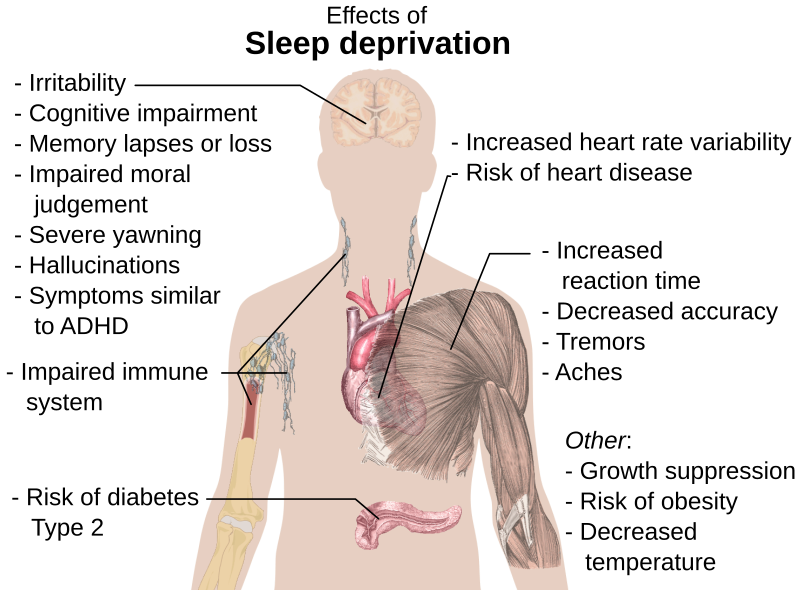Researchers Find Meditation Might Help Preserve Gray Matter In Our Brains
Slumber deprivation is pretty common these days—it'due south a major attribute of achievement-oriented societies—but why would anyone have a love-detest relationship with it? Usually, 1 would say,sleep deprivation and all the accompanying symptomsare the definition of a beloved-detest relationship, to the core.
Let me tell you something: you canutilize sleep deprivation for your ain benefit. We'll get into how this works, but commencement, permit's talk over the phenomenon of slumber, sleep impecuniousness and its symptoms, and finally design a "how to" experiment about sleep deprivation(ordinarily known as cocky-torture), and ask ourselves, more importantly, why?
Sleep: Functionality
"Sleep is a naturally recurring state characterized by reduced or absent consciousness, […] and inactivity of well-nigh all voluntary muscles." (Macmillan, 1981). This is a short and clear explanation:
- sleep is characterized by sleep stages/cycles (five cycles, differing in depth)
- the deeper your sleep, the meliorate the quality of slumber
- More Sleep ≠ Meliorate (healthy avg. 7.five-9 hours)
The functions of sleep are very multifaceted and majorly unexplored, just these (validated, and commonly accustomed) aspects interest us the virtually correct at present. Sleep has a major affect:
- on our retentivity and the power to re-organize thoughts, experiences and to larn new things (neuroplasticity)
- on the regulation of necessary hormones and the ability of our body to regenerate physically
What is Sleep Impecuniousness?
Sleep deprivation is the lack of sleep: either information technology was caused by a very superficial and short slumber (over a menstruum of some days) or past no slumber at all. The functionality and benefits of sleep are express equally a result (see above), and we might face someserious problems, if we stay sleep-deprived for a prolonged menses of time.
The effects of sleep impecuniousness are various; some occur instantly afterastute deprivation, other occur only afterchronic deprivation:

(past Mikael Häggström, Wikimedia Commons, 2009)
After acute deprivation:
- irritability
- cerebral impairment
- retentivity lapses
- restricted sentence
- severe yawning
- increased center-rate variability, increased reaction time and decreased accurateness
- temporary emotional instability
Afterward chronic deprivation:
The effects of chronic deprivation boil downwards to the evolution of various diseases, such as:
- Diabetes
- heart disease
- growth suppression
- restricted immune system functionality
- weight gain/loss
- low
Due to the diversity of acute deficits, sleep deprivation has been used as a successful interrogation technique. In fact, the U.S. military authorised slumber deprivation as an interrogation method (Leave no Marks: Enhanced Interrogation Techniques and the Risk of Criminality, August 2007).
Just hey, why would in that location be alove-hate human relationship hither? What's the benefit for us?!
How To (..and the benefits of slumber deprivation?!)
The furnishings of sleep deprivation on the homo body were observed and analyzed in the 70s: the methodological monitoring involved blood assay, just besides neuropsychological instruments to capture the brain activeness during sleep-deprivation and duringrecovery sleep after deprivation.
The results:"There'due south evidence of antidepressive upshot after sleep deprivation."As a affair of fact, subjects experienced a37.2 % improvement in their mood!
The groundwork of these results are diverse—the reasons behind the remarkable mood improvement are, amid others:
- biochemical investigations proved an increment of dissimilar hormones, including serotonin and noradrenaline, which are also known to functionas a happiness hormone (serotonin) and stimulating hormone (noradrenaline)
- improved sleep continuity and depth in the night after sleep deprivation
These mentioned effects accept activity in depressedbut also not-depressed people,significant that you can stay awake for a nighttime, begin the next twenty-four hours equally you usually practise and attempt to keep yourself awake (that's non very like shooting fish in a barrel!) and go to bed quite early → sleep like a babe → wake up the next morning withmore power and energy.
By depriving yourself of sleep, youset your biological clock to nix— in case your time management is messed up and running out of fuel, this can very helpful (a dear-detest relationship). You can call sleep impecuniousnesssleephacking: at first we abstain from sleep, and subsequently (during the recovery nighttime) we slip into a very deep state of sleep, which will regenerate usa.
Admittedly, sleep deprivation amongst healthy people is often met with skepticism, mainly because healthy subjects tin regulate their slumber pattern in other ways (through diet, sleep hygiene and sleep rituals). On the other hand, slumber impecuniousness is gratis of whatsoever serious side furnishings and tin serve as a quick fix. Here's a short how-to:
- Perform your sleep impecuniousness "experiment" on the weekend (working in a sleep deprived state can be hard)
- Go along yourself awake during your sleep deprivation night (and the following day) with the help of tea or java, but delight don't overdo it
- Become to bed early on on your sleep-deprived solar day, and enjoy your deep recovery night (7.five – 9 hours)
- Wake up powerful and energized, feeling like a million dollars
Later your slumber deprivation experiment y'all should have care of a well-balanced diet and adept sleeping habits—do not regress to old, negative tendencies. Sleep deprivation for a night tin can be applied hands, is highly effective and free of serious side effects. Have you lot already tried it? Share your experience with us!
Featured photo credit: Lux Graves via unsplash.com
kingstongreste1991.blogspot.com
Source: https://www.lifehack.org/articles/lifestyle/researchers-find-meditation-might-help-preserve-gray-matter-our-brains.html